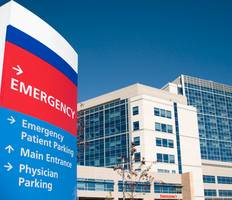Image may be NSFW.
Clik here to view. Hospitals Buy Information About Patients' Credit Card Purchases
Hospitals Buy Information About Patients' Credit Card Purchases
Hospitals Buy Information About Patients' Credit Card Purchases
Business
Companies
Health
Hospitals Buy Patient Info
Has Been Optimized
It's no secret that data mining goes on 24/7 on the web, from Facebook to Google, but now Carolinas HealthCare, which owns medical centers and hospitals in North and South Carolina, is mining people's credit card purchases.
Carolinas HealthCare has been mining consumer data on 2 million people to identify high-risk patients so that doctors can intervene before they get sick.
Although this type of information is usually gleaned from voluntary medical blood tests by the patients themselves, Carolinas HealthCare is buying information from brokers that will reveal patients' public records, the store loyalty programs that they are members of and purchases made with credit cards.
“What we are looking to find are people before they end up in trouble,” Michael Dulin, the chief clinical officer for analytics and outcomes research at Carolinas HealthCare, told BusinessWeek.com. “The idea is to use Big Data and predictive models to think about population health and drill down to the individual levels.”
In theory, this system would gauge how likely someone is to have a heart attack based on the kinds of food he or she buys, how often the patient goes to the gym, or how often an asthma patient buys asthma medication.
“The data is already used to market to people to get them to do things that might not always be in the best interest of the consumer,” stated Dulin. “We are looking to apply this for something good.”
However, some patients may not appreciate this uninvited monitoring of their daily lives by corporate America, even if it is done for the greater good.
“If the physician already has the information, the relationship changes from an exchange of information to a potential inquisition about behavior,” Ryan Holmes, assistant director of health care ethics at the Markkula Center for Applied Ethics at Santa Clara University, told BusinessWeek.com.
Ironically, Carolinas HealthCare won't reveal where it's going to get this patient info, but the two largest data brokers are Acxiom and LexisNexis.
USA Today reported in 2012 that some hospitals were mining patient information to boost their number of customers.
Provena St. Joseph Medical Center in Illinois buys information about local residents: age, income, marital status, shopping habits, and the number of children or pets at home.
Provena St. Joseph Medical Center then pitches expensive procedures related to cancer, heart and orthopedic care to the people who are likely suffering from those maladies.
While hospitals claim they are simply promoting important medical services, they like to target patients with private health insurance because it pays higher than someone covered on Medicaid or Medicare.
Sources: USA Today and BusinessWeek.com
1
Video Piece:
Regular Piece Reported by Opposing Views 23 hours ago.
Clik here to view.
 Hospitals Buy Information About Patients' Credit Card Purchases
Hospitals Buy Information About Patients' Credit Card PurchasesHospitals Buy Information About Patients' Credit Card Purchases
Business
Companies
Health
Hospitals Buy Patient Info
Has Been Optimized
It's no secret that data mining goes on 24/7 on the web, from Facebook to Google, but now Carolinas HealthCare, which owns medical centers and hospitals in North and South Carolina, is mining people's credit card purchases.
Carolinas HealthCare has been mining consumer data on 2 million people to identify high-risk patients so that doctors can intervene before they get sick.
Although this type of information is usually gleaned from voluntary medical blood tests by the patients themselves, Carolinas HealthCare is buying information from brokers that will reveal patients' public records, the store loyalty programs that they are members of and purchases made with credit cards.
“What we are looking to find are people before they end up in trouble,” Michael Dulin, the chief clinical officer for analytics and outcomes research at Carolinas HealthCare, told BusinessWeek.com. “The idea is to use Big Data and predictive models to think about population health and drill down to the individual levels.”
In theory, this system would gauge how likely someone is to have a heart attack based on the kinds of food he or she buys, how often the patient goes to the gym, or how often an asthma patient buys asthma medication.
“The data is already used to market to people to get them to do things that might not always be in the best interest of the consumer,” stated Dulin. “We are looking to apply this for something good.”
However, some patients may not appreciate this uninvited monitoring of their daily lives by corporate America, even if it is done for the greater good.
“If the physician already has the information, the relationship changes from an exchange of information to a potential inquisition about behavior,” Ryan Holmes, assistant director of health care ethics at the Markkula Center for Applied Ethics at Santa Clara University, told BusinessWeek.com.
Ironically, Carolinas HealthCare won't reveal where it's going to get this patient info, but the two largest data brokers are Acxiom and LexisNexis.
USA Today reported in 2012 that some hospitals were mining patient information to boost their number of customers.
Provena St. Joseph Medical Center in Illinois buys information about local residents: age, income, marital status, shopping habits, and the number of children or pets at home.
Provena St. Joseph Medical Center then pitches expensive procedures related to cancer, heart and orthopedic care to the people who are likely suffering from those maladies.
While hospitals claim they are simply promoting important medical services, they like to target patients with private health insurance because it pays higher than someone covered on Medicaid or Medicare.
Sources: USA Today and BusinessWeek.com
1
Video Piece:
Regular Piece Reported by Opposing Views 23 hours ago.